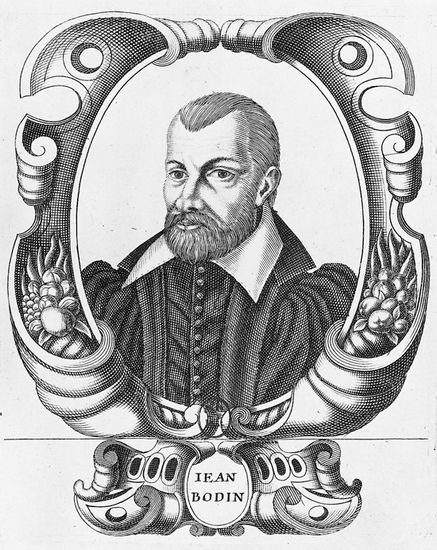Jean Bodin
Jean Bodin (c. 1530 – 1596) was a French jurist and political philosopher, member of the Parlement of Paris and professor of law in Toulouse. He is known for his theory of sovereignty. He was witch-phobic and was influential in the persecution of accused witches.
Bodin lived during the aftermath of the Protestant Reformation and wrote against the background of religious conflict in France. He remained a nominal Catholic throughout his life but was critical of papal authority over governments, favouring the strong central control of a national monarchy as an antidote to factional strife. Towards the end of his life he wrote a dialogue among different religions, including representatives of Judaism, Islam and natural theology in which all agreed to coexist in concord, but was not published.
Early life
Bodin was born near Angers, possibly the son of a master tailor, into a modestly prosperous middle-class background. He received a decent education, apparently in the Carmelite monastery of Angers, where he became a novice friar. Some claims made about his early life remain obscure. There is some evidence of a visit to Geneva in 1547–48 in which he became involved in a heresy trial. The records of this episode, however, are murky and may refer to another person.
He obtained release from his vows in 1549 and went to Paris. He studied at the university, but also at the humanist-oriented Collège des Quatre Langues (now the Collège de France); he was for two years a student under Guillaume Prévost, a little-known magister in philosophy.
Career as an author
Bodin generally wrote in French, with later Latin translations. Several of the works have been seen as influenced by Ramism, at least in terms of structure.
Bodin wrote in turn books on history, economics, politics, demonology, and natural philosophy; and also left a (later notorious) work in manuscript on religion (see under "Religious tolerance"). A modern edition of Bodin's works was begun in 1951 as Oeuvres philosophiques de Jean Bodin by Pierre Mesnard, but only one volume appeared.
De la démonomanie des sorciers
Bodin's major work on sorcery and the witchcraft persecutions, De la démonomanie des sorciers (Of the Demon-mania of the Sorcerers), was first issued in 1580, ten editions being published by 1604. In it he elaborates the influential concept of "pact witchcraft" based on a deal with the Devil and the belief that the evil spirit would use a strategy to impose doubt on judges to look upon magicians as madmen and hypochondriacs deserving of compassion rather than chastisement.
The book relates histories of sorcerers, but does not mention Johann Georg Faust and his diabolical pact. It gave a report of a 1552 public exorcism in Paris, and of the case of Magdalena de la Cruz of Cordova, an abbess who had confessed to sexual relations with the Devil over three decades. Bodin cited Pierre Marner on werewolf accounts from Savoie. He denounced the works of Heinrich Cornelius Agrippa, and the perceived traffic in "sorceries" carried out along the Spanish Road, running along eastern France for much of its length.
The book was influential in the debate over witchcraft; it was translated into German by Johann Fischart (1581), and in the same year into Latin by François Du Jon as De magorum dæmonomania libri IV. It was quoted by Jean de Léry, writing about the Tupinamba people of what is now Brazil.
One surviving copy of the text, located in the University of Southern California's Special Collections Library, is a rare presentation copy signed by Bodin himself, and is one of only two known surviving texts that feature such an inscription by the author. The USC Démonomanie dedication is to a C.L. Varroni, thought to be a legal colleague of Bodin's.
